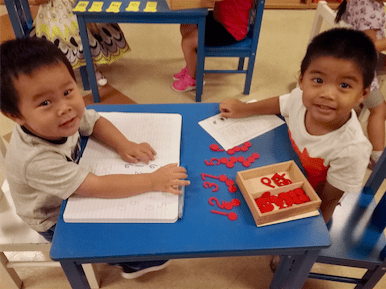 We’ve all been there before – your child has an overflowing toy box but as soon as their sibling or friend reaches for something to play with, your child immediately wants to play with that toy and a tantrum ensues. Rest assured this is very normal behavior and there are a few simple steps you can take to help encourage good sharing habits.
We’ve all been there before – your child has an overflowing toy box but as soon as their sibling or friend reaches for something to play with, your child immediately wants to play with that toy and a tantrum ensues. Rest assured this is very normal behavior and there are a few simple steps you can take to help encourage good sharing habits.
Using play based learning is an excellent way to begin practicing sharing at a very young age. When you are playing with your little one, try taking turns passing a toy back and forth and saying things like, “May I please have a turn now? Thank you!” When you hand the toy back to your child, say “It’s your turn to play now!” Through using play based learning, sharing will become a natural part of your child’s routine and it will be a less difficult skill to teach as they grow older.
Our little ones are constantly soaking in everything they see us do. “Sharing is about more than possessions,” says Kentville, NS, psychologist Kim O’Connor. “If we parents share our time and things, our kids will learn to do it too.” Throughout the day, try using language such as, “would you like to share this snack with me?” You can also give your child tools to effectively communicate with other children such as saying things like, “ I would like a turn.” or “I’m not finished with this yet” When your child understands what it feels like when they want a turn playing with a toy, they are more likely to be understanding when it comes time to share with someone else.
One of the best times to practice good sharing habits is during playdates. Instead of playing games that have a winner and a loser, be creative and come up with games that are purely for fun, as this will help eliminate competitiveness and encourage cooperation. Here are some games and activities that will help make sharing fun: Pass the Ice Cream, Quick and Easy Cooperative Games
While sharing is an extremely important skill to learn, there will be times when it’s best to accept healthy ownership. If your child is not ready to share his favorite blanket or teddy bear with his new sister, it might be best not to press the issue. Likewise, while it might be tempting to intervene when your little one isn’t sharing their toys, it’s sometimes best to let children work it out amongst themselves as this encourages independence and confidence.
There will be bumps along the way, even as your child becomes older, but with a lot of patience, practice, and creativity, sharing can become a natural part of your child’s behavior.
